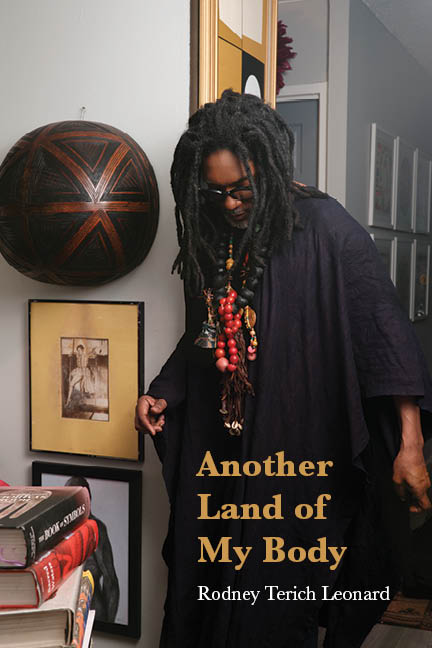
paper • 116 pages • 17.95
ISBN: 978-1-954245-94-5
eISBN: 978-1-954245-95-2
March 2024 • Poetry
Starred review from Library Journal
Ephemeral yet tangible, bridging the delicate border between understanding and awe, Rodney Terich Leonard’s poems live in the world even as they leave it, clinging like “a ribbon in the sand / Captivated by your ankle,” that “Bojangles next to your chair.” Leonard’s sophomore collection, Another Land of My Body, collects singular poems, each a distinct marvel, even as together they witness aging, champion the resilience of desire, articulate Black Southern identity, memorialize the unequal burdens of the pandemic across racial and socioeconomic strata, and preserve the time capsule of one’s particular memories that will depart with them when they go. When “COVID pumped up on” Ms. Clematine and Ms. Bessie Will, who “paid taxes in an American town with six ICU beds,” “the heirloom chitlins / & pound cake recipes / & summer-white buckets of Budweiser / To B.B. King went hush.” Leonard’s impeccable ear subverts legacy, using the musicality of lyric and the sonic patterning of form to remember neighbors alongside martyrs of the police state: “Heels cold cold-heeled history heels claimed cold: / Ahmaud Arbery-George Floyd-Rayshard Brooks.” In these pages, every figure is totemic, reiterating the invaluable outside the ceaseless binds of global capitalism. Leonard writes, “She wears her own hair & Fashion Fair. / Stutter ignores her penchant / For fried whiting & hushpuppies. / No one I know calls her baby.” “Here is a woman as monument,” he says. “My mother’s allure wasn’t from a magazine; / Jet came later.” In his own style, Leonard, too, is truly original, always encountering new terrain as he brings the past along. His poems are oft dispatches from “an abrupt ravine,” where “[he] learned another land of [his] body.” They are also lifelines, brief housecalls, promises of reunion amid temporary goodbyes. “I’m at my retrospective,” he answers the phone. “Let me call you back.”
“Another Land of My Body”
An abrupt ravine.
I learned another land of my body.
Packaged trauma-
Eleven orchids refusing mist.
Maimed to the bone.
Texture of asphalt shingles;
He rocked a red cap backwards.
My pinkie strolled across corduroy.
Grown shame is shame groomed.
Here I can’t say what I sometimes crave.
Hunger is one of my songs.
Rodney Terich Leonard’s Another Land of My Body is a book that you need to read immediately. Love poems exist here side-by-side with poems of mourning and possibility. Another Land of My Body is a book that–despite the world’s immense joys and terrors–will expand your heart and make you love poetry again and again. In a poetic landscape that is simultaneously both real and spiritual, Leonard sets up a portrait of life that is made possible by the power of mystical encounter and deeply felt experience. Leonard deftly marries the medicinal poetry of spell work and dreams with the all- encompassing power of language. With echoes of Gwendolyn Brooks, Paul Celan, Sylvia Plath, and Federico García Lorca, Leonard sets up a vision of the world as it is, in the hopes that it can one day be everything good that it promises. As Leonard writes, “You’re a rock-/Sachet of neem./A tangible leaning post./Niche to weigh intuition./Grip for the gable.” What is rock in this book is also a poem is also a space for infinity and infinite love. Love and the imagination are ignited over and over again by Leonard’s searing and caring words. These are poems with “Pasture dreams of three-leaf clovers” and “Jet-black beehive mauve powder puff.” These are poems with “Warm- warm post-martini mouth;/Artful froth” and “Red Hots & oil sausage.” These are poems that live forever.
An archive of a recording self, Rodney Terich Leonard’s Another Land of My Body operates the pulse and method for expansion. The eye pivots after being seen, after being adjudicated, reclaiming the work of judgement, sorting it out, seeing music in a wake. “Sound is a sorority,” he writes, holding the intent of poetic transformation at the language level, at the image, in the sound, amplifying the noise of a verb in a kind of verbing. “Each braid furthers us.” He furthers. He fashions from the world of surface, seeing and singing through surface, to find interiority, to record care through an ongoing pandemic, through the work of family. The book is furthering. Another Land of My Body vibrates and astonishes.